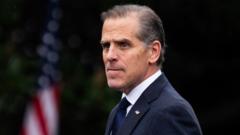Elon Musk's recent disputes with former President Donald Trump have thrown his business landscape into uncertainty. As Musk attempts to distance himself from political controversies, his statements about Trump have led to significant stock fluctuations and threats to his government contracts. With ongoing challenges in the automotive and aerospace sectors, industry analysts are questioning Musk's commitment and Strategic focus moving forward.
**Musk vs. Trump: An Explosive Feud That Could Reshape Business Futures**

**Musk vs. Trump: An Explosive Feud That Could Reshape Business Futures**
Elon Musk’s public fallout with Donald Trump raises questions about its implications for his major companies. Investors are left worried about Musk's shifting focus amid a looming boycott threat.
In a surprising turn of events, Elon Musk has found himself amid a serious public spat with Donald Trump, which could have repercussions for his business empire. After announcing a withdrawal from political discussions, investors were hopeful Musk would pivot towards enhancing the operations of Tesla and his other ventures. However, his recent remarks targeting Trump seem to have instead intensified public scrutiny and led to threats of a governmental boycott of Tesla.
The fallout has not gone unnoticed in the stock market, as Tesla’s shares plunged by 14% in response to Musk's comments, although there was a slight rebound following a temporary cooling off of tensions. Experts argue that the situation highlights not just the immediate risks posed by Trump's response but also deeper, systemic issues within Musk's multitude of companies. Some voices in the tech community, like veteran journalist Kara Swisher, claim that Tesla is at a disadvantage, particularly in the race for autonomous vehicles against competitors like Waymo.
Musk has a series of ambitious projects on the horizon, such as the much-anticipated launch of autonomous robo-taxis in Austin, Texas. Analysts believe that the effectiveness of these endeavors may be compromised by Musk's divided attention and increasing public controversies. The narrative surrounding Musk has shifted; rather than focusing on innovation and technology, questions regarding his motivation and dedication to his companies have emerged.
Moreover, criticisms are mounting over perceptions of Musk's control over Tesla and its implications for democracy and transparency. These ongoing concerns are exacerbated by organized protests under the #TeslaTakedown banner, which criticize Musk’s influence and his political alignments, effectively presenting Tesla as a symbol of disproportionate power.
Nevertheless, there remains a glimmer of hope that Musk might emerge from this controversy with a rehabilitated image among certain demographics. Some analysts recall how Bill Gates once faced a similar downturn in public perception but managed to reshape his legacy over time.
The implications of this feud extend further, as Trump's comments regarding the potential cut of Musk's government contracts—valued at $38 billion—could have dire consequences for ventures like SpaceX and Starlink, both integral to national security and commercial space travel. Although Trump's threats may seem stringent, the deep integration of Musk's companies into US government operations makes such actions complex to realize.
As the dust settles on this high-profile conflict, it remains uncertain how these developments will ultimately affect Musk’s business strategy and public persona. However, one thing is clear: both Musk and Trump face significant ramifications in their respective spheres as a result of this turbulent saga.
The fallout has not gone unnoticed in the stock market, as Tesla’s shares plunged by 14% in response to Musk's comments, although there was a slight rebound following a temporary cooling off of tensions. Experts argue that the situation highlights not just the immediate risks posed by Trump's response but also deeper, systemic issues within Musk's multitude of companies. Some voices in the tech community, like veteran journalist Kara Swisher, claim that Tesla is at a disadvantage, particularly in the race for autonomous vehicles against competitors like Waymo.
Musk has a series of ambitious projects on the horizon, such as the much-anticipated launch of autonomous robo-taxis in Austin, Texas. Analysts believe that the effectiveness of these endeavors may be compromised by Musk's divided attention and increasing public controversies. The narrative surrounding Musk has shifted; rather than focusing on innovation and technology, questions regarding his motivation and dedication to his companies have emerged.
Moreover, criticisms are mounting over perceptions of Musk's control over Tesla and its implications for democracy and transparency. These ongoing concerns are exacerbated by organized protests under the #TeslaTakedown banner, which criticize Musk’s influence and his political alignments, effectively presenting Tesla as a symbol of disproportionate power.
Nevertheless, there remains a glimmer of hope that Musk might emerge from this controversy with a rehabilitated image among certain demographics. Some analysts recall how Bill Gates once faced a similar downturn in public perception but managed to reshape his legacy over time.
The implications of this feud extend further, as Trump's comments regarding the potential cut of Musk's government contracts—valued at $38 billion—could have dire consequences for ventures like SpaceX and Starlink, both integral to national security and commercial space travel. Although Trump's threats may seem stringent, the deep integration of Musk's companies into US government operations makes such actions complex to realize.
As the dust settles on this high-profile conflict, it remains uncertain how these developments will ultimately affect Musk’s business strategy and public persona. However, one thing is clear: both Musk and Trump face significant ramifications in their respective spheres as a result of this turbulent saga.




















